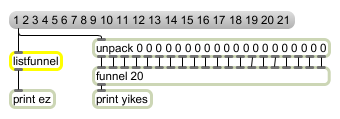Examples

Use listfunnel not only for convenience but also for variable-length lists.
Index elements of a list and output them individually
| Name | Type | Opt | Description |
|---|---|---|---|
| offset | int | opt | An integer argument is used to specify an offset for the first index value. If no argument is present, the list elements are numbered beginning with the default index of 0. |
| int | input-for-indexing [int] |
The low index value and the received number are sent out as a two-element list. |
| float | input-for-indexing [float] |
The low index value and the received number are sent out as a two-element list. |
| list | elements-for-indexing [list] |
Each element of the list is indexed and this index is prepended to the list element and sent out the outlet as a two-element list. The input list may contain ints, floats, and symbols (provided that the first element of the list is not a symbol). |
| anything | elements-for-indexing [list] |
Performs the same as . |
| offset | first-index [int] |
The word followed by an integer argument is used to specify an offset for the first index value. |
